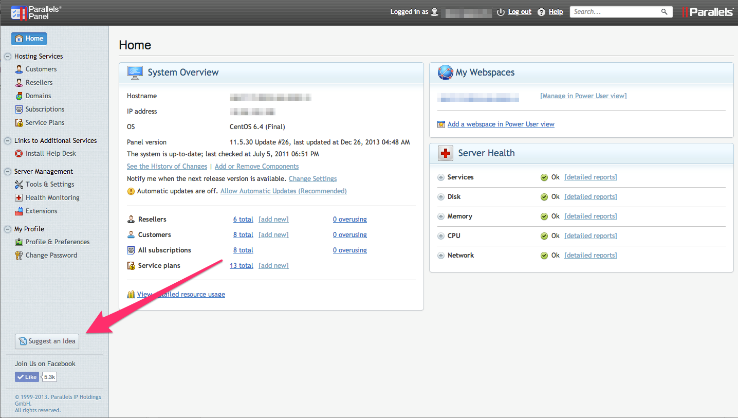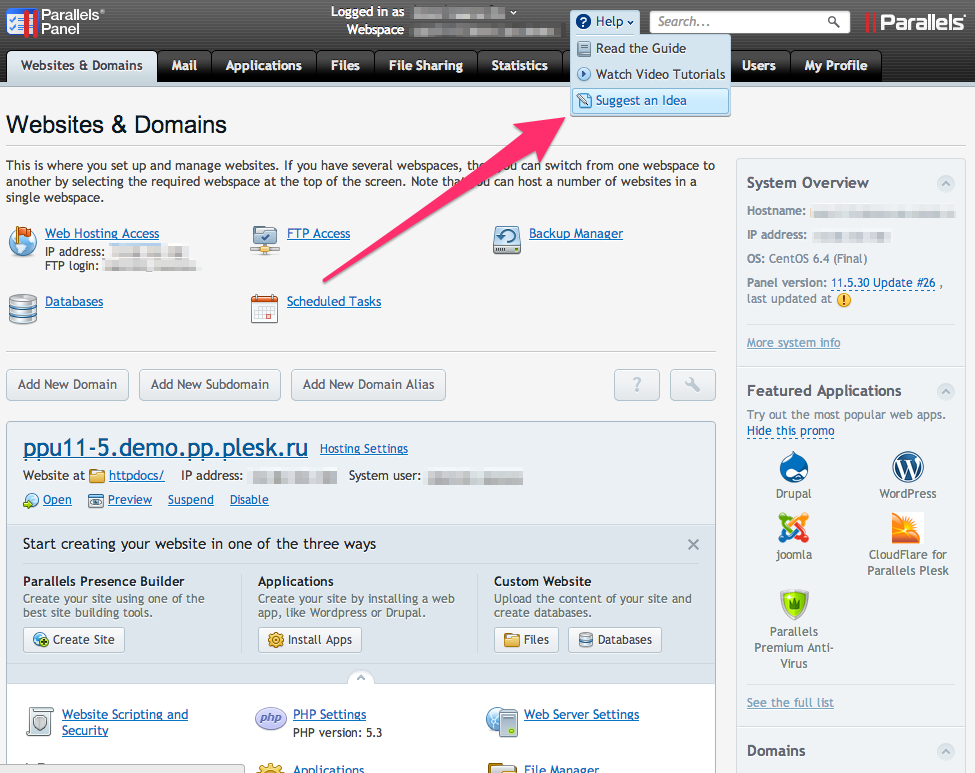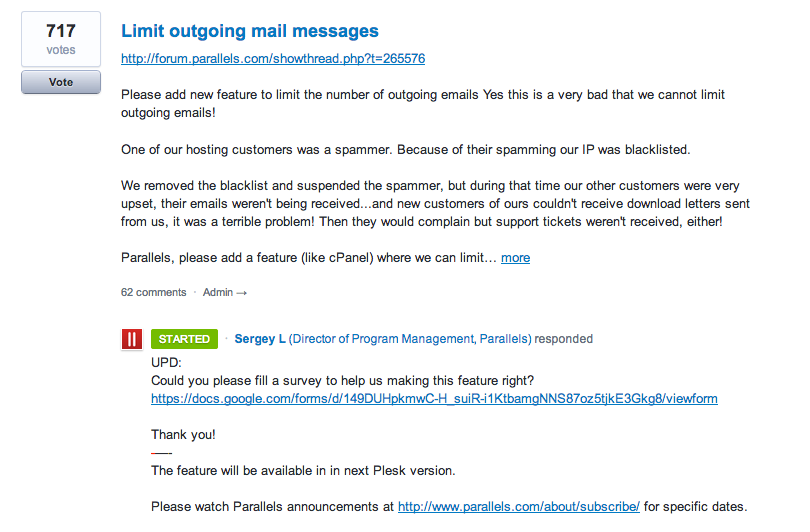Development Democracy: How Parallels uses customer voting to create new features
Probably, many users believe that they know much better than developers exactly what functions the product should have. And we really listen to all their proposals with interest. The problem is different - you can collect 1000 opinions, but you cannot do 1000 different things (and there is no sense).
To work on our Parallels Plesk product more efficiently, we decided to launch a system where every user can speak, and we can focus on the most important. As a means of implementation, we have tried the Uservoice SaaS solution. And although at first we did not like it, the final results pleased us - the problem was solved with minimal resources.
Even if only one person out of a hundred will offer us something, then with our user base it is already tens of thousands of people. In practice, this is more than a thousand offers through various channels - sales service, technical support, public forum, etc. And these are just formal proposals. This volume is very difficult to handle manually - to group recurring sentences, to clarify the details for each. In practice, processing only fresh receipts took at least 8 hours a week.
A separate problem: not all product users are our customers: most of our market is served by distributors, and many direct channels of communication with us for their customers are not available. And although we are in some form give feedback, there is a deaf phone.
The idea to establish a more orderly interaction through open voting was actually on the surface. We ourselves practiced before voting in closed expert groups. Technically, we had to expand the concept of the group to almost all users.
')
First, several services and applications came into view, including Uservoice.com , a SaaS service that offers web services for collecting and processing all sorts of feedback. But on first consideration, we rejected it, as we were looking for a “Universal Platform”, which we could flexibly customize for ourselves. And Uservoice.com looked very, very limited - there are practically no settings.
But then the prospect loomed ahead to spend quite a few hours on installing, configuring, and evaluating solutions, and then also an unknown amount of effort to maintain, upgrade, crash, debug, etc. And we decided to treat the issue easier. The uservoice.com service satisfied basic needs, did not require a cash investment (we started on a free account), the time costs are minimal - one (even the crooked) manager can do everything in a few hours. In such a minimalist format, we started in February 2013 with the portal plesk.uservoice.com , which allowed users to ask us for a new function or to support existing requests with their voices. Full lean, we did not even transfer the portal to our zone and left it at .uservoice.com.
Some concerns were inspired by the fact that we had previously tried voting for several products from the Parallels holder, and they had a rather modest effect. For example, users quite intensively asked for some function through different channels, but they didn’t want to vote for it later.
Therefore, the launch of the portal was approached as a full-fledged project in several stages:
• “Sowed” with its proven, good features that are definitely needed and useful.
• At the second stage, we invited a group of product experts from our forum, who voted first, and brought in other quality inquiries.
• Invited other users from our forum
• Opened the portal publicly by embedding directly into the product:


Of course, with such a campaign, the initial “explosion” of ideas could not be: the first 10 were ours, over the next month another 14 arrived - already from users. For more than a year of work, the number of requests exceeded 600. On the day we receive 1-3 new requests and a few comments and votes to the existing ones.
The portal has not yet completely supplanted the other supply channels, but we are increasingly suggesting that the user simply start it at plesk.uservoice.com . As soon as it is supported by a significant number of people, it will be considered with priority. This especially helps in the processing of proposals with non-obvious value.
Although the portal was launched when the next version - Parallels Plesk Panel 11.5 - was already fully planned, in that release we closed as many as 28 requests from the portal. Let these functions be planned independently, but we are very pleased with this coincidence between our views and user-defined ones. Currently, another 19 requests are implemented, some of which have already been included in version 12.0. Actually, Plesk 12.0 is about to be released, and now we are inviting those who voted to join the beta testing of the new version .
This is another convenience of the system, it is worth updating the status of the proposal and all those who voted for it receive a notification. We used this both to collect additional information (by placing polls in status) and for inviting us to test.

You can give a typical example of the discussion and implementation of the request. For example, there is a very popular feature - to limit the sending of outgoing mail from the server . It is needed to prevent spamming through your server, if the password of a user (mail, ssh, ftp) was dragged off by a trojan from his machine into someone's unkind hands.
The function is not very simple, since it is necessary to reliably identify on behalf of which particular user the mail is sent. A year or two or two ago, we chose to give a third-party solution to this problem, but it did not cope well, so we decided to withdraw it from the sale and provide our own development.
However, the implementation of these restrictions, each user in practice imagined in different ways. For example, when we sent out a poll with two options - A, B or “Other”, 80% answered “Other”. We realized that we had missed something important, opened up an additional script and rescheduled the development very much.

It happens that our developers are so light up some of the proposals that implement experimental solutions that we are not yet ready to fully support.

It should also be noted that rarely does it make sense to do a sentence exactly as requested. A wish is rather a designation of a problem or need for which rather different solutions can be proposed.
Currently, the same portal is being launched for another product - Parallels Plesk Automation ( http://pleskautomation.uservoice.com/ ), this is Plesk's older brother with the ability to manage multiple servers.
So, if you have any suggestions on the product, then you need at Plesk.uservoice.com , and if you have questions on the experience of using uservoice, then in the comments.
To work on our Parallels Plesk product more efficiently, we decided to launch a system where every user can speak, and we can focus on the most important. As a means of implementation, we have tried the Uservoice SaaS solution. And although at first we did not like it, the final results pleased us - the problem was solved with minimal resources.
Even if only one person out of a hundred will offer us something, then with our user base it is already tens of thousands of people. In practice, this is more than a thousand offers through various channels - sales service, technical support, public forum, etc. And these are just formal proposals. This volume is very difficult to handle manually - to group recurring sentences, to clarify the details for each. In practice, processing only fresh receipts took at least 8 hours a week.
A separate problem: not all product users are our customers: most of our market is served by distributors, and many direct channels of communication with us for their customers are not available. And although we are in some form give feedback, there is a deaf phone.
The idea to establish a more orderly interaction through open voting was actually on the surface. We ourselves practiced before voting in closed expert groups. Technically, we had to expand the concept of the group to almost all users.
')
How to choose
First, several services and applications came into view, including Uservoice.com , a SaaS service that offers web services for collecting and processing all sorts of feedback. But on first consideration, we rejected it, as we were looking for a “Universal Platform”, which we could flexibly customize for ourselves. And Uservoice.com looked very, very limited - there are practically no settings.
But then the prospect loomed ahead to spend quite a few hours on installing, configuring, and evaluating solutions, and then also an unknown amount of effort to maintain, upgrade, crash, debug, etc. And we decided to treat the issue easier. The uservoice.com service satisfied basic needs, did not require a cash investment (we started on a free account), the time costs are minimal - one (even the crooked) manager can do everything in a few hours. In such a minimalist format, we started in February 2013 with the portal plesk.uservoice.com , which allowed users to ask us for a new function or to support existing requests with their voices. Full lean, we did not even transfer the portal to our zone and left it at .uservoice.com.
Launch
Some concerns were inspired by the fact that we had previously tried voting for several products from the Parallels holder, and they had a rather modest effect. For example, users quite intensively asked for some function through different channels, but they didn’t want to vote for it later.
Therefore, the launch of the portal was approached as a full-fledged project in several stages:
• “Sowed” with its proven, good features that are definitely needed and useful.
• At the second stage, we invited a group of product experts from our forum, who voted first, and brought in other quality inquiries.
• Invited other users from our forum
• Opened the portal publicly by embedding directly into the product:


Effect
Of course, with such a campaign, the initial “explosion” of ideas could not be: the first 10 were ours, over the next month another 14 arrived - already from users. For more than a year of work, the number of requests exceeded 600. On the day we receive 1-3 new requests and a few comments and votes to the existing ones.
The portal has not yet completely supplanted the other supply channels, but we are increasingly suggesting that the user simply start it at plesk.uservoice.com . As soon as it is supported by a significant number of people, it will be considered with priority. This especially helps in the processing of proposals with non-obvious value.
Correlation with implemented functions
Although the portal was launched when the next version - Parallels Plesk Panel 11.5 - was already fully planned, in that release we closed as many as 28 requests from the portal. Let these functions be planned independently, but we are very pleased with this coincidence between our views and user-defined ones. Currently, another 19 requests are implemented, some of which have already been included in version 12.0. Actually, Plesk 12.0 is about to be released, and now we are inviting those who voted to join the beta testing of the new version .
This is another convenience of the system, it is worth updating the status of the proposal and all those who voted for it receive a notification. We used this both to collect additional information (by placing polls in status) and for inviting us to test.

You can give a typical example of the discussion and implementation of the request. For example, there is a very popular feature - to limit the sending of outgoing mail from the server . It is needed to prevent spamming through your server, if the password of a user (mail, ssh, ftp) was dragged off by a trojan from his machine into someone's unkind hands.
The function is not very simple, since it is necessary to reliably identify on behalf of which particular user the mail is sent. A year or two or two ago, we chose to give a third-party solution to this problem, but it did not cope well, so we decided to withdraw it from the sale and provide our own development.
However, the implementation of these restrictions, each user in practice imagined in different ways. For example, when we sent out a poll with two options - A, B or “Other”, 80% answered “Other”. We realized that we had missed something important, opened up an additional script and rescheduled the development very much.

It happens that our developers are so light up some of the proposals that implement experimental solutions that we are not yet ready to fully support.

It should also be noted that rarely does it make sense to do a sentence exactly as requested. A wish is rather a designation of a problem or need for which rather different solutions can be proposed.
Exploitation
- Cheat. Since the portal is a third-party solution, we practically do not control this issue and were a bit worried. However, uservoice.com successfully blocked a single attempt.
- Garbage and negative. It is too little. Most likely, because the smooth launch allowed to establish certain standards that were further followed simply “on the model”, motivating the audience to behave constructively. However, some examples of misuse are available, they can be divided into two groups.
- Non-objective and non-constructive sentences. For example, “make it cheaper”, “make it free”, “you have bad support”, “do not work well”, “you should not have changed it”. There are not many of them, and we can afford to answer them constructively, without slipping into a banal ban. There are two main approaches:
- ask for additional information (tell you what exactly is broken) and then transfer the request to the “need info” status.
- help than we can. For example, to say “we do not plan for free, but there are cheap versions, and there is a free trial,” and close the request.
- Requests to solve the problem on a specific server and bug reports. Requests to fix something, as well as reports about bugs on the portal are undesirable. We have this clearly written, but if you still get something, then we still try to process. If the problem is identified, then we will inform the well-known solution and close the request. If the bug is reproduced, we will fix it and close it. But if the problem is described poorly and / or the author does not answer the questions - of course, close the request as non-core.
- Non-objective and non-constructive sentences. For example, “make it cheaper”, “make it free”, “you have bad support”, “do not work well”, “you should not have changed it”. There are not many of them, and we can afford to answer them constructively, without slipping into a banal ban. There are two main approaches:
- Localization. The portal is conducted in English, and we are sometimes asked when its version will be in Russian or another language. Not exactly in the near future. Our product is geographically distributed very widely. English allows us to work with everyone, and people from different countries - to support each other's proposals with their voices. The launch of a localized version would lead to an obvious problem: at least 40 clients with native English and 40 more with English as a second language fall on one Russian-speaking client, respectively, the “Russian” sentences would inevitably have a lower rating than the “English”.
While uservoice only offers the creation of separate forums for each language in Premium-rates. But we are completely unhappy with the existence of several independent systems with different priorities. The solution to this problem lies partly in uservoice - support for multilingual forums is needed ( which is not yet available ). The second half is ours, it will be necessary to organize regular translation of national sentences into English.
What is the result?
- Yes, at the very beginning of uservoice.com we didn’t like it - it’s nice, but it’s very tight restrictions. But during the selection of software, they came to the conclusion that spending time on maintenance and configuration of your own system is inefficient. Therefore, we chose a third-party SaaS solution.
- The calculation was justified on the whole, we got used to its limitations, they turned out to be uncritical. We spend time only on work with the system in essence - answers and status updates. Its maintenance costs us 0 hours 0 minutes per month.
- The portal allows us to effortlessly single out the most requested requests (by the number of votes) from a huge total volume and work closely with the most important ones. The ability of the portal to offer the user similar suggestions from among those already instituted — in response to the text he typed — helps a lot. This allows you to drastically reduce the number of duplicate offers.
Currently, the same portal is being launched for another product - Parallels Plesk Automation ( http://pleskautomation.uservoice.com/ ), this is Plesk's older brother with the ability to manage multiple servers.
So, if you have any suggestions on the product, then you need at Plesk.uservoice.com , and if you have questions on the experience of using uservoice, then in the comments.
Source: https://habr.com/ru/post/221445/
All Articles